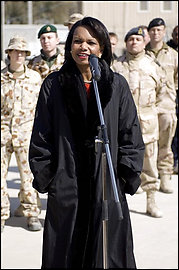This week, Defense Secretary Gates and Secretary of State Rice combined efforts on improving the dampening European support for NATO troops in Afghanistan. Gates warned the Senate Armed Services Committee, "I worry a great deal about the alliance evolving into a two-tiered alliance, in which you have some allies willing to fight and die to protect people's security, and others who are not." He continued, "it puts a cloud over the future of the alliance if this is to endure and perhaps get even worse." Following his testimony, Gates traveled to Lithuania, where he's presently meeting with NATO defense ministers, looking to pressure European allies on the troop support issue.
Perhaps the impetus for the worrisome tone was Germany's rejection of a U.S. request for more troops. Compounding the problem, Canada issued an ultimatum that it would withdraw troops if they did not receive reinforcement from NATO allies.
 While ally support is fading from Germany, France is looked at to pick up the slack. "A reversal of France's refusal to deploy combat units to the southern front-lines would ease tensions within NATOFrance is to meet a Canadian delegation Friday [today] on Ottawa's appeal for 1,000 extra troops to support its beleaguered force in volatile Kandahar province."
While ally support is fading from Germany, France is looked at to pick up the slack. "A reversal of France's refusal to deploy combat units to the southern front-lines would ease tensions within NATOFrance is to meet a Canadian delegation Friday [today] on Ottawa's appeal for 1,000 extra troops to support its beleaguered force in volatile Kandahar province."
Secretary Rice made a surprise visit to Afghanistan yesterday. While Gates is meeting with defense ministers in Lithuania, Rice also publicly urged NATO members to increase troop support. Additionally, she met with President Karzai to discuss a special envoy who could represent the numerous countries involved in the effort. "There are a lot of cooks in the kitchen. I can understand why there could be confusion, and we owe it to President Karzai to have an effective international coordinator."
Analysis on this subject can be tricky. Are alliances with our European friends fracturing for the long-term, or are they simply growing weary of the Afghanistan counterinsurgency? Certainly, we must be mindful of the political context in each country. It may be helpful to remind NATO members that the stabilization of Afghanistan is imperative for each country and cite specific reasons. Maintaining an alliance can be a juggling act. However, the United States should not feel daunted, reminding allies about the nature of the threat and persuading them to stay in the fight is a necessary process in a multilateral war. We should be grateful we have the opportunity to fall back on other resources, unlike in Iraq.